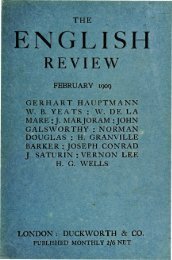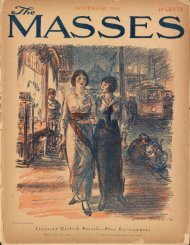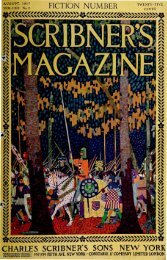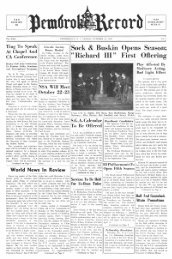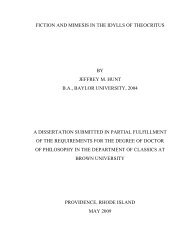View PDF - Brown Library
View PDF - Brown Library
View PDF - Brown Library
Create successful ePaper yourself
Turn your PDF publications into a flip-book with our unique Google optimized e-Paper software.
130 Personality of Colonel Goethals<br />
was among the latter, rather than among<br />
the former, that the most strenuous opposition<br />
to absolute control by one man was<br />
to be manifested.<br />
Not only was it an arm}' of civilians,<br />
but its duties were civil, not military, and<br />
covered a wide and diversified field. In<br />
order to construct the Canal it was necessary<br />
to create an American state in the<br />
heart of a Central American republic,<br />
with a civil government, schools, courts,<br />
churches, police system, post-offices, and<br />
taxation and revenue systems. This civil<br />
government, distinct from engineering<br />
control of Canal work, was exercised over<br />
one of the most heterogeneous populations<br />
ever assembled anywhere on earth,<br />
comprising at its maximum about sixtyfive<br />
thousand souls, and made up of many<br />
and widely differing nationalities—North<br />
Americans, Spaniards, Italians, West Indians,<br />
Greeks, Armenians, Central Americans,<br />
and others. To unite in one the two<br />
forms of government—engineering and<br />
civil—over this population and make it<br />
autocratic was no slight problem in administration,<br />
and so to exercise that autocratic<br />
rule as to make it not only acceptable<br />
and effective but popular was a task<br />
certainly not inferior to that of the actual<br />
construction of the Canal itself.<br />
What was needed, in fact, for the accomplishment<br />
of the gigantic work which<br />
the United States Government had undertaken<br />
on the Isthmus of Panama was a<br />
man at the head who was both a great engineer<br />
and a great administrator. This<br />
rare combination—for few engineers possess<br />
large administrative ability—was<br />
found in Colonel Goethals. He had not<br />
been long on the Isthmus before he made<br />
it apparent that both as an engineer and as<br />
an administrator he stood in the first rank.<br />
He revealed himself almost at once as<br />
that rare product of nature, the born<br />
leader of men. From the outset he took<br />
his place in a class by himself, and he held<br />
it, without dispute or question, till his task<br />
was completed. There were among his<br />
official associates able engineers and men<br />
of trained ability in other professions, but<br />
he alone possessed in the supreme degree<br />
which the case demanded the qualities of<br />
leader and administrator.<br />
It might be said that many generations<br />
had united in fitting him for his great task.<br />
The history of his family dates back to<br />
860, in which year one Honorius left Italy<br />
with the Duke of Burgundy for France.<br />
In a fight with Saracens, Honorius was<br />
struck across the neck with what was<br />
capable of proving to be a deadly blow, but<br />
because of the fine quality of his armor<br />
and the physical strength of his person no<br />
injury was caused. His escape won for<br />
him the title of "Boni Coli." Certain<br />
lands were given to him in the north of<br />
France, now forming Holland and Belgium.<br />
His nickname was translated into<br />
the native tongue as "Goet Hals," meaning,<br />
as it had in Italian, "good neck" or<br />
"stiff neck," and in course of time it was<br />
united in one word and became the family<br />
name. The family divided, part settling<br />
in Belgium and part in Holland. Colonel<br />
Goethals is descended from the Holland<br />
branch, both father and mother being<br />
Dutch. His parents migrated from Holland<br />
to the United States, and he was born<br />
in Brooklyn, N. Y., on June 29, 1858.<br />
(The name has been Americanized and is<br />
pronounced—Go-thals.)<br />
The Goethals family, in both Holland<br />
and Belgium branches, has contained<br />
many members who have achieved distinction<br />
in professional and public life, and<br />
the ancestral quality of "stiff neck" has<br />
persisted with its pristine rigidity unimpaired<br />
to the present day.<br />
With the blood of this ancestry in his<br />
veins young Goethals entered West Point<br />
Academy, from which he was graduated<br />
in 1880, standing second in his class. He<br />
was retained there as instructor in practical<br />
astronomy for a few months, when<br />
he went to Willett's Point, remaining<br />
there in the Engineering School of Application<br />
for two years. After two years'<br />
service as chief engineer on government<br />
work in the Department of Columbia,<br />
which includes the States of Idaho, Washington,<br />
and Oregon, and one year in similar<br />
work on the Ohio River, where he was<br />
in charge of dikes and dams, he returned<br />
to West Point, where he served as assistant<br />
instructor and assistant professor in<br />
civil and military engineering for four<br />
years. During the next five years he was<br />
on duty in Tennessee, part of the time in<br />
charge of the Elk River division of the<br />
Mussel Shoals Canal, and later of all improvements<br />
on the Tennessee River from



